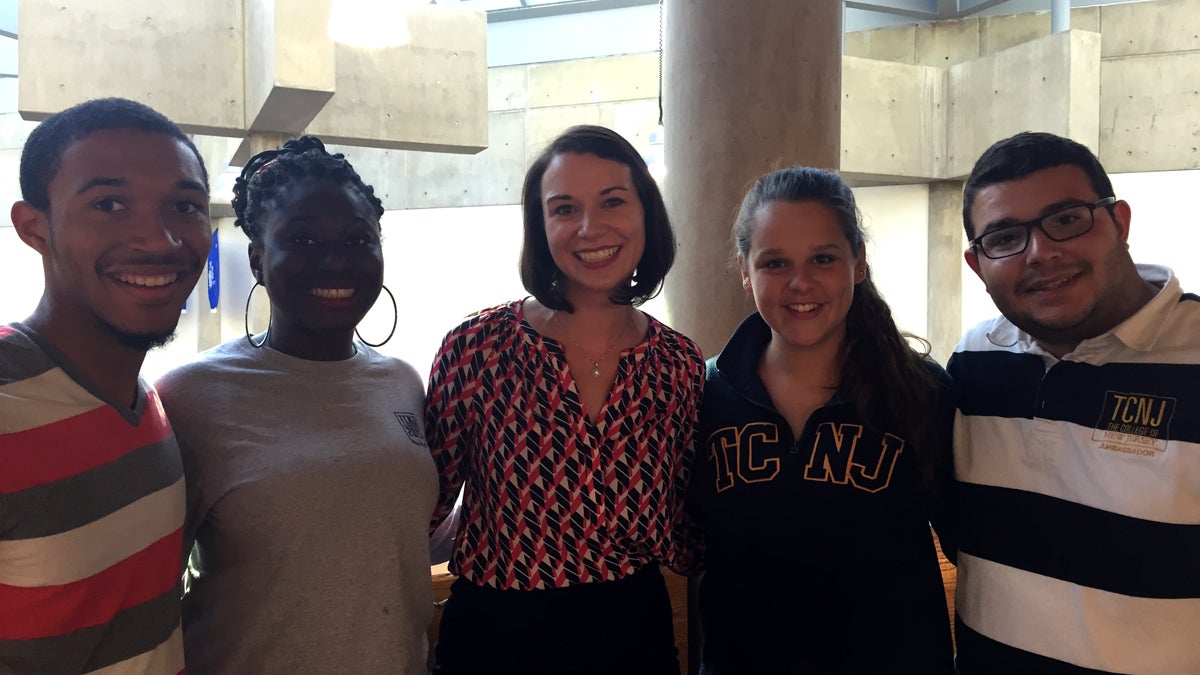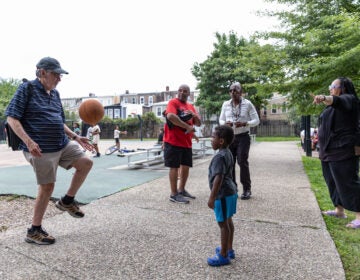Paying mentorship forward by helping students make the right moves

Elizabeth Bapasola with students at The College of New Jersey (Priscilla Nunez Photo)
College students need more than career counseling. As young adults, still shaking off adolescence, and facing huge pressures as they enter a complicated work world, they need someone to help them see themselves clearly and compassionately.
Elizabeth Bapasola, assistant vice president for student affairs at The College of New Jersey, helps students connect that clearer vision with the work world they are about to enter.
“I was attracted to the field of student affairs in higher education as a way to mentor students the way I was mentored as a college student,” Bapasola says.
Giving back in a fulfilling way
She was raised in a rural area of northeast Indiana in a family with two generations of journalists. Her family believed that “giving back” through volunteerism and community leadership was an important aspect of their field.
“My family modeled the idea that they saw themselves as community journalists — they were there to give perspective and report the news as a form of public service,” said Bapasola. “From a very young age, I wanted to help people. Before going to college, though, I always thought the best way to do that as a woman was to be a mom, wife and volunteer.”
However, coursework and student leadership transformed her understanding of how to connect her life to work that served others.
In a vocational mentoring program at Hanover College in Indiana, Bapasola met a life-changing mentor in her advisor Margaret Krantz, longtime director of the college’s career center. They regularly discussed various authors’ writings about life, work and vocation.
“The idea that you can get paid to do something you love, to help others,” Bapasola remembers. “This was transformative for me.”
Indeed, that transformation took her far beyond Indiana — all the way to Washington, D.C. She interned on Capitol Hill for a U.S. senator. She found it “exciting and glamorous,” but she quickly realized that politics was just not the right match. Nor was it where her “deep gladness meets the world’s deep need,” she says with a nod to writer Frederick Buechner.
Returning to Indiana to seek that gladness in her work life, she joined her family’s journalism career path and worked as the associate editor for a regional family magazine. But she couldn’t wait till 5:00 rolled around every day.
“At 25 years old, I asked myself, ‘When was I working and it didn’t feel like work?'” says Bapasola, “and on reflection I realized it was as a student leader in college. I came alive in that setting, and I wanted to help college students the way my college mentors helped me.”
After this realization, she discovered that the next step in her career should be in the field of student affairs in higher education. In 2006, she enrolled in the College Student Personnel graduate program at Miami University in Ohio. One of her professors, Marcia Baxter Magolda, author of the book “Authoring Your Life: Developing an Internal Voice to Navigate Life’s Challenges,” taught her how to help young adults move into their own vocational authority. When she hit the ground at Miami, Bapasola knew she was where she belonged.
“My first day on the job at Miami of Ohio as the graduate assistant for student leadership, I came alive,” she says. “I just wasn’t that way on the Hill and at the magazine. Before entering student affairs, I wasn’t using my gifts to their full potential and aligning my passion with my purpose in the present moment.”
What does that actually look like in daily interactions with students?
“It’s in how I understand vocation, how I try to model things,” she says. “I try to be vulnerable when I’m facilitating a workshop or having a conversation with a student. I see myself as a teacher and a learner alongside my students. I don’t try to give answers, but rather try to ask better questions.”
Mentorship vs. sponsorship
“I’ve been lucky to have amazing mentors and role models, both as a student in college and graduate school, and as a full-time professional,” Bapasola says. “My supervisors and mentors have given me more opportunity than what I was ready for on paper, but in spirit and leadership capacity, I was eager, equipped and prepared.”
To be seen as able to do more than it might look like on paper is something many of us long for — especially when we’re building a career path. Particularly for women, it can help crack the glass ceilings.
Bapasola has a good way of describing it, by drawing a distinction between mentorship and sponsorship.
“Sponsorship is giving people opportunities. Mentoring is sharing your story to coach people along. Sponsoring is opening doors that might not have been open otherwise and putting yourself out there to open them [for someone else].”
When she was hired, she says, her boss was sponsoring her, taking a risk on her. So when she started, she wanted to do well, in part, because she was being trusted to do well.
She pays it forward to the students she works with who are afraid of failing or making mistakes. “I try to reframe things for them, helping them to ‘focus on progress and not perfection,'” she says. It’s a motto she learned from a colleague. “In my work with students, I try to help them find their voice and passion and empower them to become the author of their own lives.”
And, finally, to strengthen their level of feeling accepted and affirmed.
“Once I was co-facilitating a six-day leadership institute,” Bapasola says. “The opening idea I used with my students was, ‘Wherever you are in the journey of life, you are welcome here as you are.’ Being accepted as a whole person is a fundamental human desire, and you question a lot of that when you’re on your own for the first time in college. At any stage of life, though, we should always remind ourselves, that we are enough just as we are, and all of us have something good to offer the world.”
WHYY is your source for fact-based, in-depth journalism and information. As a nonprofit organization, we rely on financial support from readers like you. Please give today.




